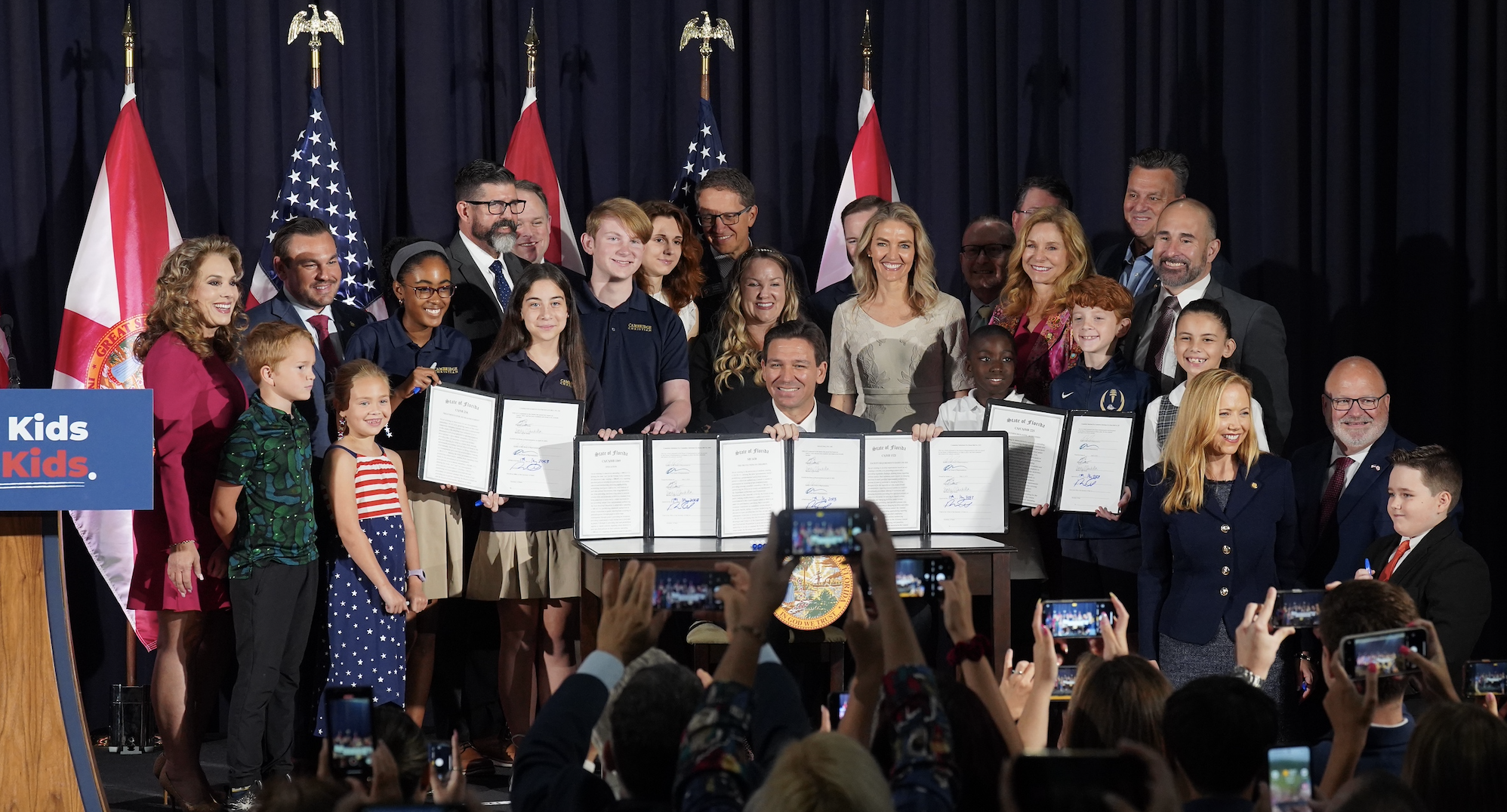In what may be turn out to be one of most consequential lawsuits yet filed in defense of the freedom to read, six major publishers, the Authors Guild, and several bestselling authors have teamed up with students and parents in Florida to file a federal lawsuit challenging the constitutionality of two provisions of the state’s recently enacted H.B. 1069. The complaint argues that the vague and overbroad statute has led to the improper removal of hundreds of books from school and classroom libraries in the state. (Authors signed onto the suit include Julia Alvarez, Laurie Halse Anderson, John Green, Jodi Picoult, and Angie Thomas.)
Specifically, the August 29 complaint challenges two parts of section 1006.28 of the law: one that broadly prohibits books in public schools that contain any content that “describes sexual conduct,” and another that bans books that contain allegedly “pornographic” content “without consideration of the book as a whole, as the Supreme Court requires.” The suit was filed in the Middle District of Florida, in Orlando, with all of the Big Five Publishers (Hachette, HarperCollins, Macmillan, Penguin Random House, and Simon & Schuster) along with Sourcebooks (a majority of which is owned by PRH, but which operates independently) signing on as plaintiffs.
“House Bill 1069 violates the First Amendment rights of publishers, authors, and students by forcing teachers, media specialists, and their school districts to remove books or face penalties, including loss of licensure,” the complaint states. “The Publisher Plaintiffs and the Author Plaintiffs…have the First Amendment right to disseminate and have read their constitutionally protected books, and the Student Plaintiffs…have the First Amendment right to receive and read constitutionally protected books, free from unconstitutional content-based restrictions mandated by the State of Florida. Plaintiffs bring this action to safeguard their fundamental rights and the rights of others under the First Amendment.”
The lawsuit seeks two declaratory judgments from the court. The first is that H.B. 1069’s prohibition on content that “describes sexual conduct,” which applies to grades K–12, is “overbroad” and thus unconstitutional. The second is that the law’s vague term “pornographic” in Section 1006.28 is either “synonymous” with the “harmful to minors” standard defined by Florida law, which is appropriately grounded in the Supreme Court’s standard for obscenity set forth in Miller v. California, or, if that’s not the case, a ruling that the law’s undefined prohibition of “pornographic” content is unconstitutional. The suit does not challenge any other provisions of the law, nor the state’s previous “harmful to minors” standard.
“
House Bill 1069 violates the First Amendment rights of publishers, authors, and students by forcing teachers, media specialists, and their school districts to remove books or face penalties.
”
“Plaintiffs do not challenge the ‘harmful to minors’ standard and do not seek to prevent Florida school districts from ensuring that school libraries do not contain obscene books.” the suit explains. “Instead, Plaintiffs take issue with the removal of books under the guise of ‘pornography’ that are not remotely obscene, resulting from the Florida State Board of Education’s unconstitutional construction of the term ‘pornographic.”‘
In the suit’s opening paragraph, the plaintiffs note that classic books including Maya Angelou’s I Know Why the Caged Bird Sings; Ralph Ellison’s Invisible Man; Ernest Hemingway’s For Whom the Bell Tolls; Zora Neale Hurston’s Their Eyes Were Watching God; Aldous Huxley’s Brave New World; Toni Morrison’s The Bluest Eye; Leo Tolstoy’s Anna Karenina; Richard Wright’s Native Son; Kurt Vonnegut’s Slaughter-House Five; and Alice Walker’s The Color Purple “are some of the many books” removed from school libraries under the law.
“These books are timeless classics, renowned for their literary value,” the suit states. “They have been on the shelves of school libraries for years, and they are not remotely obscene. But Florida has required these books and others to be removed from school libraries under its broad, across-the-board, content-based mandates that forbid consideration of the books’ merit or value.”
Florida Governor Ron DeSantis signed H.B. 1069 into law in May 2023 as part of a suite of bills that defined his so-called “Let Kids Be Kids” agenda. But critics of the law say that its vague language has led to widespread book banning in schools statewide.
The suit comes after a group of parents and Florida public school students along with the ACLU filed suit in June alleging that the law’s content review procedures discriminate against parents who oppose book bans and censorship. It is one of several by publishers now pending in federal court, including challenges in Arkansas, Iowa, Texas, and in Escambia County, Florida.
“As publishers dedicated to protecting freedom of expression and the right to read, the rise in book bans across the country continues to demand our collective action,” the six attached publishers said in a joint statement. “Fighting unconstitutional legislation in Florida and across the country is an urgent priority. We are unwavering in our support for educators, librarians, students, authors, readers— everyone deserves access to books and stories that show different perspectives and viewpoints.”
